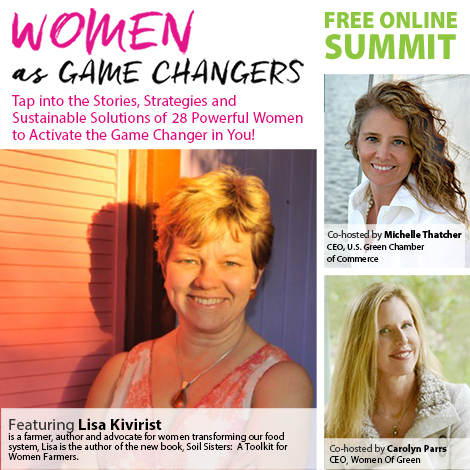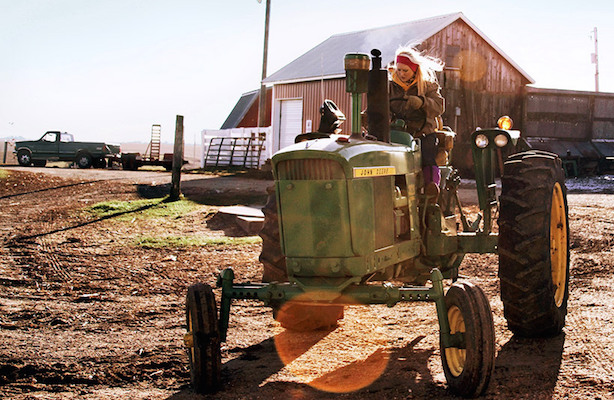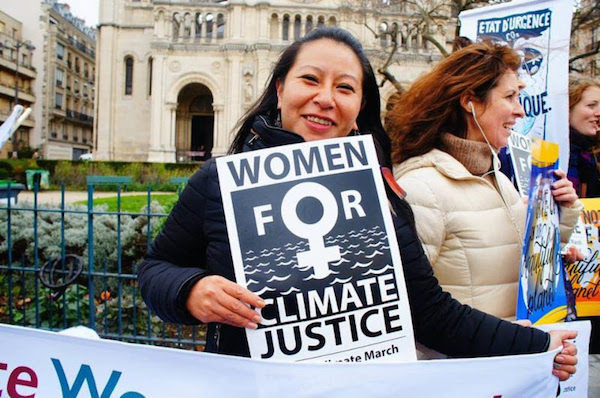“Hidden Connections,” a thought-provoking digital video series premiering today, explores one of the human consequences of climate change — specifically its little-known link to child marriage. TakePart, the digital division of Participant Media, and the Thomson Reuters Foundation teamed up to produce the three-part series, which gives an intimate look at the lives of two young girls living in Bangladesh.
Continue reading... →What if you could turn your dishes into dirt? Well, thanks to Susanna Carson, you can. She tell us all about her game-changing work at the upcoming Women As Game Changers: Creating a New Game Conference: Creating a New Game on October 13-14 in Santa Fe, NM. Maybe that’s why this video is so green! Susanna Carson is an entrepreneur building her personal and corporate legacy through the business of sustainable / compostable packaging. She is the founder and CEO of BSI Biodegradable Solutions, a compostable packaging distribution company, and more recently BESICS Packaging Corporation, a compostable retail products company.
Continue reading... →How do you engage and motivate a global audience of a million followers each week? Learn the tricks of the trade by Shana DeClercq, who is the voice for “The Story of Stuff”. Shana DeClercq serves as the Community Engagement Manager for The Story of Stuff Program, which is a rapidly growing movement dedicated to changing the cultural conversation about materialism, landfill waste, and the culture around the entire process.
Continue reading... →Mitch Hedlund is the founder and executive director of Recycle Across America, a 501 (c) non-profit dedicated to simplifying the act of recycling with the goal that the general public will be able to recycle more and recycle right. In this “Women as Game Changers” summit interview, Mitch talks about turning your passion into a game changing idea.
Continue reading... →In this Women as Game Changers Interview with Lisa Kivirist, Lisa tells an engaging story about her and her family’s journey from the urban, paved jungle, to an organic farm. She inspires women to become social and business entrepreneurs and leaders in the growing rural renaissance and sustainable living movement.
Continue reading... →New Year’s health resolutions don’t need to be overwhelming, here are 50 small steps towards a healthier 2016. Choose to be happy, rather than right. Don’t talk about your body like it is a war zone. Your words create your reality. Make peace with food. Live for questions, not answers. Try using a wakeup light instead of an alarm clock. Add grassfed collagen to your soups, smoothies and sauces. Incorporate the practice of Ayurvedic Tongue Scraping for oral health. Switch packaged protein bars for a healthier homemade option. Learn to make kale delicious. Ditch the melatonin habit. Do a facial lymph massage. It provides gentle drainage to help relieve sinus pressure and fluid build-up. Have a desk job? Switch to a standing desk. Do a mouse-arm stretch to relieve tension if you use a computer all day. Eat a raw carrot daily for better hormones. Feeling stressed? Bust out 4-7-8 breathing. Dry brush your body before showering for softer skin and detoxification. Eat more ghee. Detox your bedroom. Roll the bottom of your feet over a golf ball. It is a powerful massage and activates numerous reflexology points. Switch to non-toxic makeup. Do the twist… any yoga twist! Any twist position (siting or standing twists) give a massage to […]
Continue reading... →With the end of the year just around the corner, we wanted to reflect on all that we have to be grateful for in 2015. There’s a lot to celebrate! From promoting conservation to empowering beginning farmers, here is the National Sustainable Agriculture Coalition’s list of the Top 15 Highlights of 2015: Conservation and Environment 1. 2015 opened with the first ever Conservation Stewardship Program (CSP) contract renewals. CSP, a program that NSAC has championed, is the only farm bill conservation program to support performance-based advanced conservation systems for working farms. 70 percent of expiring acres were renewed by producers ensuring that more than 17 million acres will continue to be supported through new and ongoing conservation activities. The year also ended on a high note for CSP: the Natural Resources Conservation Service (NRCS) postponed the CSP overhaul until 2017, buying more time for stakeholder input and outreach around the changes, and just this week Congress approved an omnibus budget bill that eliminated House-proposed cuts to CSP funding in 2016. 2. National Sustainable Agriculture Coalition (NSAC) member organizations and supporters submitted hundreds of comments to USDA recommending ways to improve the interim rules to implement 2014 Farm Bill changes to conservation programs, […]
Continue reading... →Studies show that collective intelligence rises with the number of women in a group—but women are often underrepresented at talks like COP21. Meet 15 leaders worth listening to. Women, particularly those in developing countries, are on the frontlines of a changing climate. Extreme weather events, deforestation, and loss of biodiversity threaten their survival and that of their families. Yet, when confronted with social and economic exclusion, women’s vulnerabilities remain hidden and their voices quiet. Women have been severely underrepresented at high levels of policymaking around global environmental concerns as well. In the climate arena, the need to improve women’s participation in negotiations was explicitly recognized by COP 7 in Marrakech in 2001 as the impact of gender balance on decisionmaking became more evident. Why is this a problem? Studies show that collective intelligence rises with the number of women in a group. Engaging a critical mass of women is linked to more progressive and positive outcomes and to more sustainability-focused decisionmaking across sectors. Yet, women have remained a notable minority in climate negotiations at both the national and international level, in the global scientific body on climate change, the Intergovernmental Panel on Climate Change (IPCC), and in media debates about climate. Women’s representation in bodies and […]
Continue reading... →








